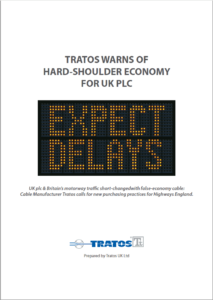“Circular economy” needs Smart Highways Infrastructure
Cables ‐ the last component to be considered for design and build projects where the significant costs are typically in civil and structural engineering elements of the work?
Not anymore. Their role is on the rise as technology‐dependant SMART motorway schemes proliferate.
Cables enable electronic display signs, speed enforcement, surveillance cameras and vehicle sensors – the neural networks that manage traffic flow. But what if the cables powering all of this are not up to the job or, worse, undiscovered fakes – bringing unforeseeable problems.
In its Highways White Paper, cable manufacturer Tratos says the cables purpose‐designed to help keep our motorways moving are losing out to cheaper off‐the‐shelf products. Lower spec cable that is not designed for (and will fail in) the highways’ harsh operating environments is a real threat to UK PLC, clogging arterial routes and triggering economy‐damaging delays.
Highways England, which has an imperative to cut costs, is paying more, not less, for a built‐to-fail network ‐ but it is not to blame.
As it pushes forward with smart motorways, the organisation’s network of contractors manages on a supply and fit basis. Some are being cross‐sold cheaper cable when their preference is not in stock with the reassurance that the replacement ‘does the same thing’. That too is correct, it does, but not for long in a particularly harsh environment it wasn’t designed to cope with.
To re‐enable the cable powering traffic flow, Tratos proposes:
- Highways England should be given more help to maintain and monitor its Type Approval mechanism to reduce its exposure to operational failure of its technology schemes.
- Only then can it stop the installation of non‐approved cables on its highways and motorways by prime contractors. Where breaches in its Type Approval mechanism are found, it should be the specific contractor that `makes good’.
- The planned Traffic Management Technology framework by Crown Commercial Services on behalf of Highways England and others should stipulate the Type Approval mechanism and bar procurement outside accredited framework suppliers.
- Highways England should consider negotiating with its approved suppliers to maintain a call‐off stock level ‐ which is currently practised in the railway and electrical distribution network industries ‐ to better manage its cable inventory and improve delivery timescales.
If our smart motorways are to be relied upon to deliver their promise, one thing is for sure: installing fake or sub-standard cable will drive failure.
Cables need to be correctly specified, correctly purchased and checked. Just because it carries what looks like the right label doesn’t mean it is the real deal. The UK has one of the worst fake cable problems. Often imported these cables skimp on essential materials for safety and performance to achieve cheaper manufacturing and attractive prices. They don’t meet standards and they’re dangerous. Tratos continues to add its voice to the campaign to crack down on fake cables.
Tratos is actively campaigning for change in the following areas:










